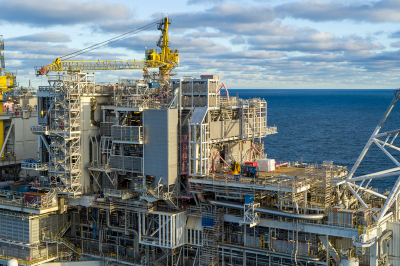NEWS ANALYSIS: Troubled state oil and energy company Equinor has resorted to a major clean-up of its finances, operations and even personnel before new CEO Anders Opedal officially takes over on Monday. The company has taken more huge losses on its disastrous US oil investments, reduced its oil price expectations and is soon expected to launch a new strategy more in line with a low-carbon world.

Outgoing CEO Eldar Sætre isn’t enjoying a triumphant exit after spending his entire working career at the state oil company (Statoil) that he re-named Equinor in 2018. Even then, the company seemed to want less association with both the state and oil, despite its ongoing expansion into risky and environmentally controversial oil projects abroad.
The worst have been tar sands in Canada and fracking and shale oil in the US, which have cost the company more than NOK 200 billion over the last several years. The losses in the US stunned both the Parliament and the government, which still owns 67 percent of Equinor, and led to charges they’d been covered up. Shamed top leaders including Sætre, his predecessor Helge Lund and board leader Jon Erik Reinhardsen have had lots of explaining to do, and a Parliamentary hearing on the losses is scheduled for next week.
In what appears to be its latest pre-emptive strike, Equinor announced on Thursday another NOK 27 billion in writedowns of asset values for the third quarter alone. Newspaper Dagens Næringsliv (DN), which exposed the extent of Equinor’s huges losses in the US last spring, reported how nearly half of the new losses (NOK 13 billion) are tied to the company’s Houston-based operations. Total third-quarter losses on Equinor’s US portfolio amounted to USD 1.6 billion (NOK 15 billion).
For Equinor’s own report of its third-quarter results, click here (external link to Equinor’s website).
The US operations, initiated by former Statoil CEO Helge Lund, contributed mightily to much poorer overall results than even analysts following Equinor had expected. Sætre, in his last presentation before retirement, had to release a huge decline in profitability, from earnings of NOK 2.59 billion in the same quarter last year to just NOK 0.78 billion in the three months ending September 30. After-tax results including all the the writedowns left Equinor with a loss of around NOK 20 billion. The board nonetheless increased its dividend, to 11 US cents a share, which was higher than analysts had expected.
Sætre blamed “weak” oil prices (which fell to less than USD 40 a barrel on Thursday) and the Corona pandemic that has dramatically reduced demand for oil. He claimed the company has responded with “considerable” cost control and “strong financial discipline.”

He’s clearly trying to convey a message that Equinor’s management is dealing with major mistakes of the past. He’ll at least be turning over a cleaner slate to Opedal, who can try to mount a fresher start to his tenure as the new chief executive of Norway’s biggest company.
Equinor has been subjected to massive criticism over its expansion into not just the US but also tar sands in Canada and other land-based projects. They include a little-publicized venture into northwest Turkey that newspaper Aftenposten recently reported was unsuccessful and cost NOK 1.5 billion. Equinor has also recently invested NOK 1.6 billion in a land-based project in Argentina that has yet to be evaluated.
Analysts argue that Statoil/Equinor is a company that excelled in offshore projects but has “flunked” in land-based projects. “I give Equinor a failing grade on its land-based investments outside the US, too,” analyst John Olaisen of Oslo brokerage firm ABG Sundal Collier told Aftenposten/E24. Equinor landed in a corruption scandal in Iran, saw assets expropriated in Venezuela and clearly gave up in Turkey. Nor do analysts think Equinor is profiting from projects on the tundra of eastern Russia.
Lowering oil price expectations
After being branded as one of the world’s most optimistic companies regarding the future of oil prices, meanwhile, Equinor’s quarterly report also notes that the company has now finally joined other oil majors in lowering its lofty predictions that had been criticized. Equinor’s quarterly report shows that the company now expects oil prices to lie at around USD 65 a barrel in 2025, down from the USD 78 it expected earlier. Equinor thinks oil prices then may rise for awhile, without offering specifics, but then decline gradually, with an average price for the years 2021-2050 now set at USD 64 a barrel, and below USD 60 in 2050. Gas price expectations have also been reduced.
Meanwhile, the expected value of untapped offshore oil and gas reserves in Norway’s Arctic offshore areas has fallen as well, adding to the controversy of expensive, risky and environmentally dubious exploration projects.

It’s in this environment that Opedal is taking over, and expected to take Equinor into a world where oil is less popular and valuable than it’s traditionally been. Analysts expect him to signal that he no longer will invest in land-based oil projects and gradually pull out of existing ones. He’s also expected to put much more effort into renewable energy projects, not just to project a greener imager for Norway’s state oil company but because that’s where new profits may lie.
Opedal’s entry also comes just after the sudden departure of one of his rivals for the CEO job: Lars Christian Bacher announced his resignation as finance director late last week after nearly 30 years at the company. Bacher wouldn’t elaborate on the reasons for his departure, beyond stating in a press release that he felt the time was right to move forward with new work outside the company. An Equinor spokesman claimed Bacher’s departure came at his own initiative and he’s not leaving empty handed: Bacher was due to work until November 1 but will remain employed, available and still be paid his salary through next May. DN reported on Thursday that he’s also getting an extra severance package that contains Equinor shares worth as much as NOK 2 million.
DN has also reported that Opedal, who had an introductory meetings with Prime Minister Erna Solberg last week, had signaled a “clear change of direction” for Equinor in his final job interview with Equinor’s board. He’s been putting together a new management team for Equinor. A new, updated strategy for Equinor is due to be unveiled at the company’s capital markets day in February.
NewsInEnglish.no/Nina Berglund

